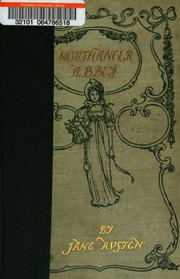
Northanger Abbey
By Jane Austen
Subjects: Appreciation, Adoptees, Marriage, Young women, Courtship, Readers, England, fiction, Gentry, Northanger Abbey, Open Library Staff Picks, Horror tales, Uncles, Fiction, general, 823/.7, Suspense, Tłumaczenia polskie, Fathers and daughters, Country homes, Fiction, gothic, Families, English Love stories, Large type books, Motherless families, Cousins, Romance, Fiction, historical, general, Ship captains, Emma Woodhouse (Fictitious character), Morland, catherine, Books and reading, Mœurs et coutumes, Manners and customs, Romans, nouvelles, Horror tales--appreciation--fiction, Austen, jane , 1775-1817, Romance fiction, English Romance fiction, Children of the rich, Powieść angielska, Female friendship, Young women--england--fiction, Horror tales--appreciation, Social classes, Gothic novels, Nineteenth century, Young women--fiction, Books and reading--fiction, Mate selection, Young women, fiction, Fiction, satire, Fiction, Children's fiction, Pr4034 .n7 2004, Social life and customs, Literature: Classics, British and irish fiction (fictional works by one author), Economic aspects, Persuasion (Austen, Jane), Fiction, romance, general, Sisters, English literature, Love stories, English, Romantaic suspense novels, Nineteenth century,, Correspondence, Northanger Abbey (Austen, Jane), Rejection (Psychology), Satire, Young women -- Fiction, Fiction, horror, English Novelists
Description: Northanger Abbey is both a perfectly aimed literary parody and a withering satire of the commercial aspects of marriage among the English gentry at the turn of the nineteenth century. But most of all, it is the story of the initiation into life of its naïve but sweetly appealing heroine, Catherine Morland, a willing victim of the contemporary craze for Gothic literature who is determined to see herself as the heroine of a dark and thrilling romance. When Catherine is invited to Northanger Abbey, the grand though forbidding ancestral seat of her suitor, Henry Tilney, she finds herself embroiled in a real drama of misapprehension, mistreatment, and mortification, until common sense and humor—and a crucial clarification of Catherine’s financial status—puts all to right. Written in 1798 but not published until after Austen’s death in 1817, Northanger Abbey is characteristically clearheaded and strong, and infinitely subtle in its comedy.
Comments
You must log in to leave comments.